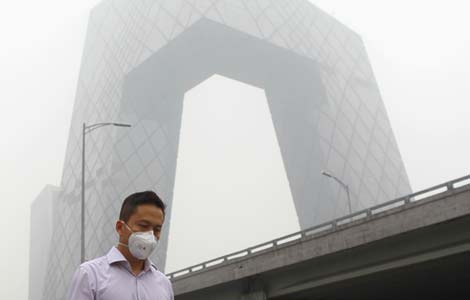Crunch time for financial reforms
Updated: 2013-07-02 08:05
By Shi Jianxun (China Daily)
|
||||||||
To keep pace with the prospering banking sector regulations should focus on quality and structural optimization
widespread drastic slump in the prices of financial stocks has sparked grave concerns and intense speculation about whether the world's second-largest economy is suffering a money squeeze.
However, according to data released by China's central bank, the country's M2 supply grew 15.8 percent year-on-year in May and its deposit balance approached 100 trillion yuan ($16 trillion). The volume of its social financing reached 9.11 trillion yuan in the first five months of this year, an increase of 3.12 trillion yuan from the same period last year. China's lending balance had reached 67.22 trillion yuan, a 14.5 percent rise year-on-year by the end of May, and its funds outstanding for foreign exchange held by financial institutions was more than 1.5 trillion yuan from January to April, in sharp contrast with the 494 billion yuan in the whole of 2012. All these indicate that China's financial liquidity is still at a high level and the recent "funds shortage" has been mainly caused by structural factors.
As a matter of fact, China's currency supply has remained abundant, as indicated by the great enthusiasm among agencies and individuals to purchase gold, wealth management products and real estate. Large volumes of non-government capital are actively seeking new investment chances.
From a superficial perspective, the recent "liquidity freeze" among some of China's commercial banks has been caused and exacerbated by factors such as increased pressure to add funds to the central bank reserves within required deadlines and the increased withdrawal of funds by enterprises to pay half-year bonuses to employees, as well as their own mid-year performance assessments. Relevant departments' accelerated tightening of monitoring over commercial banks' wealth management products and cross-border arbitrage activities have also increased the demand for funds so the banks can bring themselves in line with States regulations.
However, the fundamental factors underlying the recent "money crunch" lie in the unrestrained expansion of China's financial business, lack of supervision and management to keep pace with its prospering financial sector, as well as the serious departure of the country's financial development and service system from meeting the demands of the real economy.
What China needs is not more money supply, but a fully fledged financial system that can provide a sound guarantee mechanism for the real economy. The country's stock market also needs systematic improvements to restore investor confidence and effectively protect their interests.
The government has injected a lot of liquidity into the market to stimulate economic growth in the years following the onset of the global financial crisis, but a large portion of this liquidity has flown to the financial sector in search of higher profits instead of going to funds-thirsty manufacturing.
Compared with small and medium-sized enterprises, large State-owned ones and listed companies have had easier access to bank loans. But these loans are sometimes used for repeated arbitrage, resulting in an unhealthy rise in the country's social financing volumes, as indicated by the issuance of a large volume of newly increased lending via non-traditional credit channels.
According to China's central bank, about a half of the country's newly increased credit was lent via "shadow banks". While evading detection from the financial authorities, the unrestricted expansion of shadow banking has not only squeezed the flow of funds to the real economy, it has also increased the financial risks.
Also there can be no denying that the recent liquidity crunch in China is to some extent related to the outflow of some hot money under growing expectations that the United States will withdraw from its years-long quantitative easing.
The Federal Reserve has made clear its intention to phase out its monetary easing policy amid signs of economic recovery. This would have repercussions for the global economy, financial markets and property prices. In this sense, the recent "money crisis" in China is a kind of advance response among investors to such expectations.
The authorities have paid close attention to the problems exposed by the country's money crunch. At a recent State Council meeting, Premier Li Keqiang called on banks to better use their new loans and activate old ones. He also promised more support to economic transformation and upgrading. These messages possibly herald major financial reforms, which are, in fact, inevitable.
The government should continue to tighten its monitoring over liquidity, refrain from recklessly injecting liquidity into the market, rectify the booming non-governmental financing business and change misdistribution of some of its financial resources, in a bid to prompt banks to accelerate their deleveraging, reduce shadow banking activities and channel more financial resources to the real economy.
While maintaining the continuity and stability of the country's monetary policies, the central bank should change its financial regulations from focusing on quantity to focusing on quality and structural optimization.
The country should try to include the opaque shadow banking business into the transparent funds and bonds market, stunt local governments' impulse to expand their leverage-based financing sector and really channel more funds into the real economy to bolster the national economic upgrading.
Efforts should also be made to push for marketized reforms of interest rates in a bid to promote good interaction between the financial sector and real economic players. At the same time, the country should allow non-governmental capital to enter its financial market to promote diversification of its funds supply system.
The author is a professor with the School of Economics and Management at Tongji University in Shanghai.
(China Daily USA 07/02/2013 page11)

 Egypt army gives Mursi 48 hours to share power
Egypt army gives Mursi 48 hours to share power
 No quick end in sight for Beijing smog
No quick end in sight for Beijing smog
 New filial law sparks debate
New filial law sparks debate
 Bakelants claims Tour de France second stage
Bakelants claims Tour de France second stage
 2013 BET Awards in Los Angeles
2013 BET Awards in Los Angeles
 Gay pride parade around the world
Gay pride parade around the world
 Four dead in Egypt clashes, scores wounded
Four dead in Egypt clashes, scores wounded
 New NSA spying allegations rile European allies
New NSA spying allegations rile European allies
Most Viewed
Editor's Picks

|

|

|

|

|

|
Today's Top News
Kerry hails China's denuclearization bid
19 firefighters killed in Arizona fire
Book reveals islands' true history
Tokyo warned not to resort to 'empty talk'
Snowden applies for Russian asylum
No quick end in sight for Beijing smog
New home prices defy curbs
Mandela 'still critical but stable'
US Weekly

|

|






